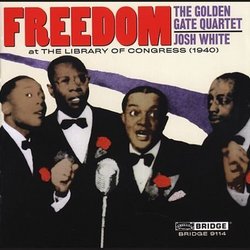| All Artists: Josh White, Sterling Brown, Alan Lomax, Alain Locke Golden Gate Quartet Title: FREEDOM: The Golden Gate Quartet & Josh White at The Library of Congress (1940) Members Wishing: 2 Total Copies: 0 Label: Bridge Original Release Date: 2/15/2002 Release Date: 2/15/2002 Genres: Blues, Folk, Classical, Gospel Styles: Chamber Music, Historical Periods, Classical (c.1770-1830), Contemporary, Traditional Number of Discs: 1 SwapaCD Credits: 1 UPC: 090404911422 |
Search - Josh White, Sterling Brown, Alan Lomax, Alain Locke Golden Gate Quartet :: FREEDOM: The Golden Gate Quartet & Josh White at The Library of Congress (1940)
 | Josh White, Sterling Brown, Alan Lomax, Alain Locke Golden Gate Quartet FREEDOM: The Golden Gate Quartet & Josh White at The Library of Congress (1940) Genres: Blues, Folk, Classical, Gospel
A recording of an historic concert, released for the first time! This 1940 concert was part of a celebration of the 75th anniversary of the end of slavery in the United States. Performing are the legendary Golden Gate Qu... more » |
Larger Image |
CD DetailsSynopsis
Album Description A recording of an historic concert, released for the first time! This 1940 concert was part of a celebration of the 75th anniversary of the end of slavery in the United States. Performing are the legendary Golden Gate Quartet with Josh White, singing Spirituals, Blues and Work Songs. The concert features commentary by Alan Lomax, the poet Sterling Brown, and Alain Locke, the godfather of the Harlem Renaissance. Immediately after this concert, Eleanor Roosevelt engaged White and the Golden Gate to perform at FDR?s inauguration. BRIDGE 9114 Similar CDs
|
CD ReviewsThe Freedom Struggle Back In The Days Alfred Johnson | boston, ma | 01/29/2009 (5 out of 5 stars) "Originally I had intended to review this historically valuable CD as part of my review of the work of Josh White (see Josh White review, "Free and Equal Man", Archives February 2, 2009). However, after reading the copious liner notes provided by the Library of Congress, as always informative, that accompany the CD and then hearing the songs and oral presentations I believe that this work deserved a separate entry in this space. Especially as this is being reviewed during Black History Month.
One can argue for the historical value of this work on two levels. First as a tribute to the 75th Anniversary of the Thirteenth Amendment to the United States Constitution, the one that formally abolished slavery after the Northern victory in the bloody Civil War. That is a worthy tribute in itself. Second, the Cd has value as an extremely informative and almost scholarly presentation of the way that black musical culture acted as an integral part of the general American musical milieu as it evolved over the past couple of centuries. The first reason needs no special explanation here as the issue of the roots of slavery, the central fact of slavery (and its aftermath) in American history and the fight against it have been detailed in many entries and at many times elsewhere in this space. I will thus concentrate on the musical element. Needless to say any musical program that has Josh White on it is assured of being a quality presentation. Here Josh accompanies the Quartet as guitarist and does a couple of his own songs. Moreover, the Golden Gate Quartet is a rather fine example of that old jubilee singing tradition popular in the early part of the 20th century that is discussed in the liner notes. What is surprising, although it should not be, is that the oral presentations are so informative. Based on the well-known researches of John and Alan Lomax and others like Sterling Brown and Alain Locke this is one of the best compilations of information about the roots of black music in all its forms: work songs, labor camp songs, prison songs; the farm; the hard life; the hard loves; and, in a few pieces just plain whimsy. Most importantly though, this 1940 Concert CD and its accompanying booklet should let one and all know that well before we of the "Generation of '68" , who cut our political teeth on the civil rights struggle in the South in the early 1960's, took up the battle other forces had already paved our way. I speak here of the ground work done by the Lomaxes and others to bring this music to the notice of the larger public, but also of Josh White and others like Big Bill Broonzy in the cultural struggle against segregation as well as attempts by black scholars like John Hope Franklin and the above-mentioned Sterling Brown and Alain Locke to give some historic perspective to the struggle against slavery. I would hope that in 2015 when the 150th Anniversary celebration comes along we have a comparable piece of work to present on that occasion. And a more, much more, equitable society." |

 Track Listings (23) - Disc #1
Track Listings (23) - Disc #1

